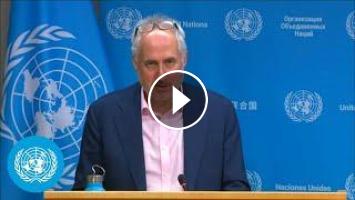Noon Briefing by Stéphane Dujarric, Spokesperson for the Secretary-General.
Highlights:
-Gaza
-Occupied Palestinian territory
-Lebanon
-Democratic People’s Republic of Korea
-Secretary-General
-Syria conference
-Ukraine
-Papua New Guinea
-South Sudan
-Sudan
-Security council
-Bangladesh
-International Day of UN Peacekeepers
-Guest
GAZA
The Secretary-General has condemned in the strongest terms the 26 May air strikes by the Israeli Defense Forces on Rafah, which hit tents sheltering displaced people. The Secretary-General is heartbroken by the killed and injured, including many small children. As he has said before, the horror and suffering must stop immediately.
The Secretary-General grieves for the over 36,000 Palestinians and some 1,500 Israelis killed in the relentless violence, including the gruesome acts of terror in Israel on 7 October 2023, the devastating Israeli assault on Gaza, and the continued indiscriminate rocket launches towards Israel from Gaza. The humanitarian catastrophe in Gaza is now compounded by the unconscionable prospect of a man-made famine.
The Secretary-General reiterates his demand for an immediate ceasefire and the immediate and unconditional release of all hostages. He recalls the recent orders of the International Court of Justice, which are binding and must be respected.
The Secretary-General calls on the Israeli authorities to allow, facilitate and enable the immediate, safe and unhindered delivery of all humanitarian supplies assistance to those in need and all crossing points must be open .,in line with Security Council resolution 2720 (2023). Humanitarian organizations must have full, rapid, safe and unhindered humanitarian access to reach all civilians in need across Gaza, in line with [Security Council] Resolution 2712 (2023).
We must work expeditiously to restore security, dignity and hope for all of the affected population. This will require urgent efforts to support and strengthen the new Palestinian Government and its institutions, including for preparing the Palestinian Authority to reassume its responsibilities in Gaza. We must also move forward with tangible and irreversible steps to create a political horizon.
The devastation and the misery of the past seven months have reinforced the absolute need for Israelis, for Palestinians, for States of the region and the broader international community to take urgent steps that will enable the parties to re-engage on the long-delayed political path to achieve a two-State solution. The United Nations will continue to support all such efforts.
OCCUPIED PALESTINIAN TERRITORY
On the ground, the Office for the Coordination of Humanitarian Affairs (OCHA) says that the intensification of hostilities and issuance of evacuation orders have displaced more than 940,000 people from Rafah in the past three weeks, alongside 100,000 who have been displaced in northern Gaza. That is according to estimates by UNRWA and OCHA and Juliette I am sure will have a lot more.
Attacks on Rafah have continued unabated, and civilians displaced by hostilities lack shelter, they lack food, they lack water and other supplies essential to their human survival.
Health facilities there continue to face dire shortages of fuel and medical supplies while having to cope with a rising influx of casualties due to injuries and burns.
Our humanitarian colleagues tell us that while the Kerem Shalom crossing remains open in principle, it is extremely difficult for aid organizations to access from the Gaza side due to the hostilities, challenging logistical conditions, and complex coordination procedures.
However, as of yesterday, we were able to access 43 trucks at the Kerem Shalom site. In addition, access constraints continue to hamper the delivery of life-saving humanitarian aid inside Gaza. Between 1 and 26 May, 137 humanitarian aid missions to areas that require coordination across Gaza were facilitated by the Israeli authorities, 86 were impeded after getting a green light or denied access to begin with, and 43 were cancelled by the organizers, the humanitarian organizers.
LEBANON
The peacekeeping mission in southern Lebanon reports that the Force Commander and Head of the Peacekeeping mission there, General Aroldo Lázaro , visited sector west of the Blue Line over the weekend to assess the situation on the ground.
He noted that the dedication and efforts of peacekeepers to de-escalate tensions, patrol, and support the Lebanese Armed Force and local communities continue, despite over seven months of exchanges of fire across the Blue Line.
We reiterate the importance of returning to a cessation of hostilities under the framework of Security Council resolution 1701 (2006) and to avoid any acts that may further escalate the tensions over the Blue Line.
Full Highlights:
https://www.un.org/sg/en/content/noon-briefing-highlight?date%5Bvalue%5D%5Bdate%5D=28%20May%202024
Highlights:
-Gaza
-Occupied Palestinian territory
-Lebanon
-Democratic People’s Republic of Korea
-Secretary-General
-Syria conference
-Ukraine
-Papua New Guinea
-South Sudan
-Sudan
-Security council
-Bangladesh
-International Day of UN Peacekeepers
-Guest
GAZA
The Secretary-General has condemned in the strongest terms the 26 May air strikes by the Israeli Defense Forces on Rafah, which hit tents sheltering displaced people. The Secretary-General is heartbroken by the killed and injured, including many small children. As he has said before, the horror and suffering must stop immediately.
The Secretary-General grieves for the over 36,000 Palestinians and some 1,500 Israelis killed in the relentless violence, including the gruesome acts of terror in Israel on 7 October 2023, the devastating Israeli assault on Gaza, and the continued indiscriminate rocket launches towards Israel from Gaza. The humanitarian catastrophe in Gaza is now compounded by the unconscionable prospect of a man-made famine.
The Secretary-General reiterates his demand for an immediate ceasefire and the immediate and unconditional release of all hostages. He recalls the recent orders of the International Court of Justice, which are binding and must be respected.
The Secretary-General calls on the Israeli authorities to allow, facilitate and enable the immediate, safe and unhindered delivery of all humanitarian supplies assistance to those in need and all crossing points must be open .,in line with Security Council resolution 2720 (2023). Humanitarian organizations must have full, rapid, safe and unhindered humanitarian access to reach all civilians in need across Gaza, in line with [Security Council] Resolution 2712 (2023).
We must work expeditiously to restore security, dignity and hope for all of the affected population. This will require urgent efforts to support and strengthen the new Palestinian Government and its institutions, including for preparing the Palestinian Authority to reassume its responsibilities in Gaza. We must also move forward with tangible and irreversible steps to create a political horizon.
The devastation and the misery of the past seven months have reinforced the absolute need for Israelis, for Palestinians, for States of the region and the broader international community to take urgent steps that will enable the parties to re-engage on the long-delayed political path to achieve a two-State solution. The United Nations will continue to support all such efforts.
OCCUPIED PALESTINIAN TERRITORY
On the ground, the Office for the Coordination of Humanitarian Affairs (OCHA) says that the intensification of hostilities and issuance of evacuation orders have displaced more than 940,000 people from Rafah in the past three weeks, alongside 100,000 who have been displaced in northern Gaza. That is according to estimates by UNRWA and OCHA and Juliette I am sure will have a lot more.
Attacks on Rafah have continued unabated, and civilians displaced by hostilities lack shelter, they lack food, they lack water and other supplies essential to their human survival.
Health facilities there continue to face dire shortages of fuel and medical supplies while having to cope with a rising influx of casualties due to injuries and burns.
Our humanitarian colleagues tell us that while the Kerem Shalom crossing remains open in principle, it is extremely difficult for aid organizations to access from the Gaza side due to the hostilities, challenging logistical conditions, and complex coordination procedures.
However, as of yesterday, we were able to access 43 trucks at the Kerem Shalom site. In addition, access constraints continue to hamper the delivery of life-saving humanitarian aid inside Gaza. Between 1 and 26 May, 137 humanitarian aid missions to areas that require coordination across Gaza were facilitated by the Israeli authorities, 86 were impeded after getting a green light or denied access to begin with, and 43 were cancelled by the organizers, the humanitarian organizers.
LEBANON
The peacekeeping mission in southern Lebanon reports that the Force Commander and Head of the Peacekeeping mission there, General Aroldo Lázaro , visited sector west of the Blue Line over the weekend to assess the situation on the ground.
He noted that the dedication and efforts of peacekeepers to de-escalate tensions, patrol, and support the Lebanese Armed Force and local communities continue, despite over seven months of exchanges of fire across the Blue Line.
We reiterate the importance of returning to a cessation of hostilities under the framework of Security Council resolution 1701 (2006) and to avoid any acts that may further escalate the tensions over the Blue Line.
Full Highlights:
https://www.un.org/sg/en/content/noon-briefing-highlight?date%5Bvalue%5D%5Bdate%5D=28%20May%202024
- Category
- United Nations
- Tags
- UN, United Nations, UNGA
Be the first to comment













